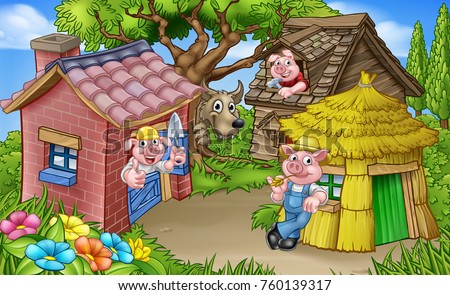THE
THREE LITTLE PIGS AND THE BIG BAD WOLF:
CONFLICT
& COMMUNICATION
EDUC
6165
The Three Little Pigs is
a childhood story that has stuck with me for years. When I think of
communication I think of measures each pig took to settle conflict taking action and how they show both unproductive and productive communication with the big bad wolf. One pig uses straw on his home
to shield from the huffs and puffs of the big bad wolf as the second pig uses
sticks to try and protect him and his brother. Both pigs lost their homes to the wolf...
However, the third little pig was able to defeat the huffs and puffs using
sturdy brick to protect himself and his brothers after the wolf lost his
breath and determination to take over the pigs' home. Eventually the pigs and
the big bad wolf were able to find some sort of communication to resolve
conflict of safety and security… and power.
Considering conflict and
communication, this childhood story reminds me of daily struggles individuals’
encounter that involve fighting for what is theirs or fighting to hold down
their own post (or position). Though the concept of The Three Little Pigs is
figuratively used in this blog I would like to share a personal conflict I have
been experiencing which involves higher power, work ethics, and different
perspectives of management. All in all, a “brick home” and sense of self
security due to cruel treatment by a particular coworker who, to me, acts as
the big bad wolf huffing and puffing as if it were a hobby of hers shows
conflict within communication -unproductively .
According to authors
O’Hair and colleagues (2015), I see there are
types of conflict individuals face that involve bad “characters” who appear or
make a poor impression to others. Unproductive conflict (O’Hair, et al., 2015)
is conflict that has no open window for positive resolutions or relationship.
Like the first two pigs who made their homes of straw and sticks the big bad
wolf was able to destroy what they built with no mean of good
communication or any hopes of relationship –obviously.
Like the pigs,
unproductive conflict has also left a rift in my communication efforts and any
potential work relationship with my coworker who plays the role of the big bad
wolf brilliantly. But, like every story, there is always room for
reconciliation mentioned by O’Hair and colleagues (2015) that suggests apology,
forgiveness, collaboration, and mutual friendship that stems from productive
conflict.
Productive conflict is when different sides, like the pigs and the
wolf or my coworker and I, find compromise such as respecting space, work
ethics, and accepting exchanged feelings toward management that benefits each
other’s outlooks (O'Hair, et al., 2015). This is a great strategy to help resolve ongoing conflict in
the work place or even in society. The Three Little Pigs and the big bad wolf
is a childhood story that I find relevant to communication and conflict and the
idea that conflict can have successful endings. This applies to real life
situations as I am concluding. Therefore, another strategy I find helpful
toward conflict resolutions is finding a common agreement that both sides
cannot be right all the time. Having strong work abilities and knowledge I
would like my coworker to walk in my shoes as I am trying to walk in hers. If
this is not plausible, walls will come down and a vicious cycle of unproductive
conflict will harvest bad communicative behaviors in the work place.
So, being
an active listener, finding agreement and or compromise influences nonviolent
communication. This helps my goals as an aspiring educator to recognize
different roles, ethics, and different behaviors that can induce conflict which
is no good for anyone. We all look for that happy ending as I see in the story
The Three Little Pigs who lived happily ever after once the big bad wolf found
that conflict was useless and relationship was more appropriate in effective
communication.

Works Cited
O'Hair, D., Wiemann, M.,
Mullin, D. I., & Teven, J. (2015). Real communication (3rd. Ed). New
York: Bedford/St. Martin's.
Dear Cassandra,
ReplyDeletesomehow your post really shakes me, because you give the example from children story, which it teaches children and reminds us as adults that this is the picture of real life too. Individually we fight for our problem with different kind of solution. Even if we have the same problem, we have different kind of solution, and the difference can come from our many different background. I really love your post.
I hope that my blog shakes you in a good way Diah. When I was presented this assignment the first thing that came to mind was the big bad wolf. We ALL face someone or something that has negative communication with us or we witness negative communication between others. In the end, we just try to settle any conflict finding resolution. There may be changes, there may be sacrifices, and we may have to be forceful. Standing up to conflict -the big bad wolf- is important. I just wanted to show an example even if it’s a child’s story because children is our focus...
DeleteThank you for the feedback!
Cassie, I have never thought about the big bad wolf as a story full of conflict, though it truly is. As you stated we continuously face something that had negative effects through communication and sometimes we all "blow-up" to try and get our way which is not the way it should go. I love have you related the two to what we are learning about.
ReplyDeleteThank you for the feedback Quinn. I try to keep it interesting. :) But what better way to learn than to compare and contrast experiences that we all are familiar with... conflicting or not.
Delete